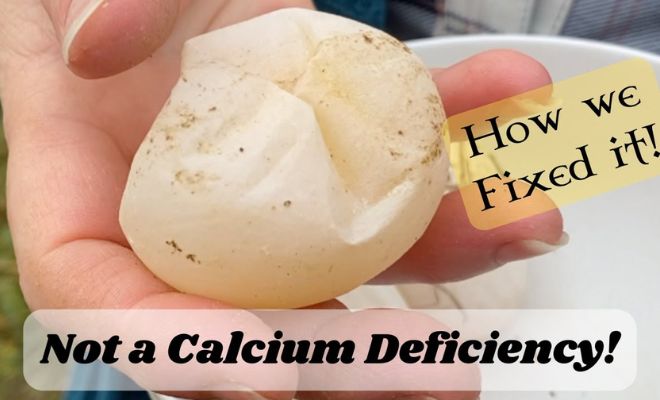
Discovering open the coop to find soft-shelled eggs instead of hard-shelled ones can be alarming! Don’t worry, soft-shelled eggs are more common than you might think.
But why did my chicken lay a soft egg? Soft eggs often result from nutritional deficiencies. Mainly when a chicken doesn’t get enough calcium. Also, stress and environmental factors can play a role, in disrupting the reproductive system. Calcium boost, layer feed, and a better environment can help them bounce back to lay good-quality eggs.
Intrigued to know more about soft egg laying? Let’s follow the guide to have happy and healthy chickens for hard-shelled eggs!
Table of Contents
5 Reasons Why My Chicken Lay A Soft Egg!

You become stressed with the chickens as they’re laying soft eggs, right? Don’t worry! Let’s point out the main culprits behind it!
1. Calcium Deficiency
This is the most common reason for soft eggs.
Hens require a significant amount of calcium to produce strong, hard eggshells. If their diet lacks sufficient calcium, the eggshells will be thin, soft, or even missing entirely.
This deficiency can occur due to an imbalanced feed, or lack of access to calcium supplements like oyster shells. Or it could happen due to not having enough calcium reserves.
And guess what! It’s common in older hens!
2. Imbalance in Diets
While calcium is the primary nutrient associated with eggshell strength, other dietary deficiencies can also contribute to soft eggs.
Inadequate levels of vitamin D, phosphorus, or manganese can affect a hen’s ability to metabolize and utilize calcium effectively. So, it results in poor eggshell quality.
3. Stress and Environmental Factors
Stress can have a significant impact on a hen’s egg production and quality.
Environmental factors can cause stress in chickens. For example –
- Extreme temperatures
- Changes in lighting
- Predator threats or
- Overcrowding.
When a hen is stressed, it can disrupt the egg-forming process, leading to soft or malformed eggs.
4. Age and Egg Production
As hens age, their ability to produce strong eggshells decreases. This is because their calcium reserves become depleted over time, and their bodies can’t replenish the calcium as efficiently.
Older hens, typically those over 2 years old, are more prone to laying soft eggs due to this natural aging process.
5. Health Issues
Certain health problems or diseases affecting a hen’s reproductive system can lead to soft eggs.
These include issues like egg yolk peritonitis, reproductive tract infections, or even certain viruses or parasites. Such health problems interfere with the egg-forming process.
While less frequent, internal parasites or illness can sometimes contribute to soft-shelled eggs. If you notice soft eggs alongside symptoms like lethargy, changes in droppings, or decreased appetite, consult a veterinarian.
What Indicates It’s a Soft-Shelled Eggs by My Poultry?
It’s a good question to know what actually we should consider soft eggs. So, here are the symptoms and indications –
- Weird Shape: Soft eggs might not be the usual oval shape. They could be lumpy or not quite right.
- Easily Squished: If you press gently on a soft egg, it can get squished or dented easily. Regular eggs are much tougher.

- Sticky Shell: The shell of a soft egg might feel wet or sticky because it’s not as solid.
- No Shell: Sometimes, there’s barely any shell at all! You might only find bits of shell or just the inside part.
- Flexible Shell: Soft shells are like rubber and can bend without breaking easily.
- Cracks: Soft eggs can crack or split, especially when they’re being laid or touched.
- Leaking: If the shell is super soft or missing, the egg can leak out.
- Hard to Check: Because they’re so soft, it’s tricky to shine a light through them to see inside.
How Do I Stop My Chickens from Laying Soft-Shelled Eggs?
Don’t fret about the occasional soft-shelled egg! Here’s a multi-pronged approach to keep your chickens laying strong eggs.
Increase Calcium Intake
Provide a calcium supplement like crushed oyster shells, limestone, or a calcium-enriched grit for your chickens to consume freely. Offer calcium-rich treats like cooked eggshells, crushed eggshells, or calcium grit.
Eggshells are mostly made of calcium carbonate crystals, making up about 95-97% of their structure. Chickens need a steady supply of calcium to make sure they have enough.
Ensure their regular feed contains adequate levels of calcium (around 4% for laying hens).
Optimize Vitamin D
Vitamin D aids in calcium absorption and the utilization of strong eggshells. Provide access to direct sunlight or supplement with a Vitamin D3 source.
Consider adding a small amount of cod liver oil to their feed.
Manage Stress Levels
Reduce stress factors like overcrowding, predators, loud noises, or changes in routine. Provide adequate nest boxes and perching space to prevent competition and stress.
Keep the Temperature Ideal
When it gets really hot, like above 80 degrees Fahrenheit, it’s not good for chicken eggs.
To keep the eggs strong, make sure your chickens can find shade, cool water, and good airflow. This helps them stay comfortable and keeps their eggs from getting soft or damaged in the heat.
So, ensure they have a nice shady spot to chill out and plenty of fresh water to drink.
Check for Diseases or Parasites
Monitor for any signs of illness or parasitic infections that may affect egg production. Consult a veterinarian if necessary and treat any underlying health issues.
Ensure Proper Nutrition
Feed a complete, balanced layer feed with the appropriate levels of protein, phosphorus, and other essential nutrients. Supplement with fresh greens, vegetables, or fruits for additional nutrients.
In a grown hen, the ratio of phosphorus to calcium is usually balanced at around 1:10. It’s good for keeping eggshells strong. But if there’s too much phosphorus, it can throw off this balance.
In that case, it’s a good idea to give the chicken extra calcium. It’s not because she’s lacking calcium, but to help bring the phosphorus ratio back. And it’s take it to the right level and keep her eggshells strong.
Monitor Aging Flock
As hens age, their ability to produce strong eggshells decreases due to depleted calcium reserves. Consider culling older hens (over 2-3 years) if soft eggs become a persistent issue.
Provide Nest Box Bedding
Use materials like wood shavings or straw in nest boxes to cushion eggs and prevent cracking or damage. They need a safe and comfortable space to lay eggs.
I suggest checking the following video of this pretty girl sharing about chickens and soft eggs.
Some Notes to Take in Consideration….
- Soft shell eggs come out when chickens have finished molting or have taken a break from laying eggs in the winter.
- Black soldier fly larvae or leafy greens can help with strong eggshells.
- Another reason for weird eggs is if the last egg stayed too long inside the chicken before coming out.
- Not enough protein in their food also causes soft-shelled eggs.
- Chickens also lay eggs that are too small, too big or have more than one yolk.
FAQs
So you have all the reasons and guides for chickens’ soft eggs. Still, have questions in mind? Check the FAQ section to enlighten your mind!
Q. Are soft-shell eggs safe to eat?
No, soft-shelled eggs should be discarded and not consumed. They are more susceptible to bacterial contamination without a hard, protective shell. Also, it poses a higher risk of salmonella or other foodborne illnesses.
Q. Chicken laying soft eggs and diarrhea, what does it mean?
If a chicken is laying soft eggs and also experiencing diarrhea, it could indicate a potential health issue. It’s the disease affecting the chicken’s digestive and reproductive systems. For example – an infection, parasitic infestation, or nutritional deficiency.
Q. Why are my chickens laying runny eggs?
Chickens laying runny or liquid eggs sometimes referred to as “egg slime,” can be a sign of several issues. It happens due to an infection or disease affecting the reproductive tract. It’s a severe calcium deficiency preventing proper eggshell formation.
Final Words
Soft eggs in chickens can happen because of different reasons like not enough calcium, imbalance in diets, stress, getting older, or health problems. But you can fix these issues by giving your chickens more calcium and vitamin D, keeping them calm, and taking care of them well.
Remember, soft-shelled eggs should not be eaten due to the risk of bacterial contamination. By following these guidelines, you can ensure your chickens stay happy and healthy, laying good-quality eggs!






